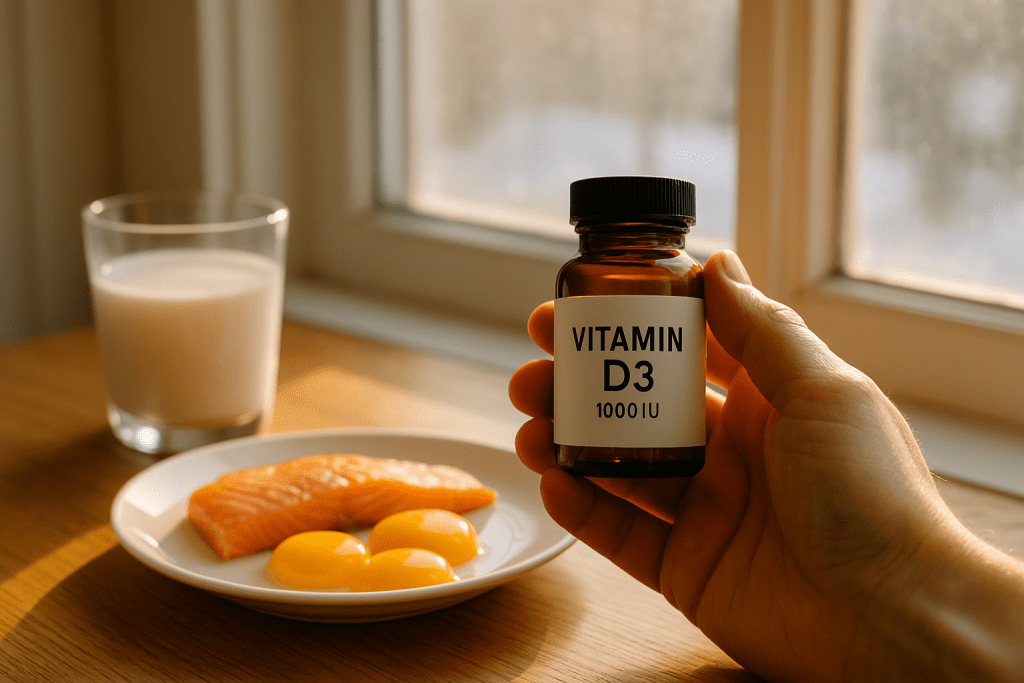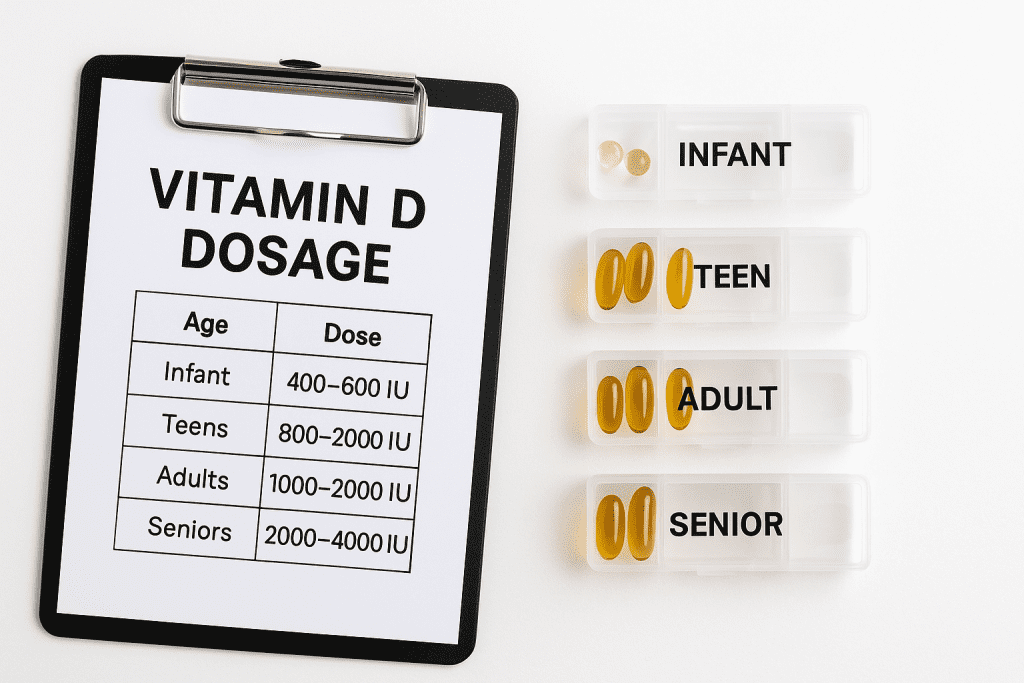What are the real benefits of vitamin D—and how do you know if you’re getting enough?
This guide breaks down the latest science on vitamin D benefits, deficiency symptoms, and dosage strategies tailored by age and health status. From supporting immune resilience to preserving bone density and lifting mood, vitamin D plays a vital role in multiple systems.
If you’re wondering whether you need a supplement, how much to take, or how to avoid common mistakes, this article provides the answers backed by clinical evidence.
Summary / Quick Answer
Vitamin D supports immune function, bone strength, and mood regulation. Deficiency is common, especially in winter or with limited sun exposure.
Here’s what you need to know:
- Key benefits: Supports immunity, bone density, and mental health
- Deficiency signs: Fatigue, bone pain, frequent illness
- Optimal levels: 50–125 nmol/L (20–50 ng/mL)
- Daily dosage: 400–4000 IU/day, adjusted for age, season, and health
- Best forms: Vitamin D3 supplements, sunlight, and fortified foods
Use our Vitamin D Dosage Calculator for personalized guidance.
What Is Vitamin D? Forms, Functions & Bioavailability

Vitamin D is a fat-soluble vitamin essential for calcium regulation, immune signaling, and brain health. It exists in two main forms:
- Vitamin D2 (ergocalciferol): Found in some plants and fortified foods
- Vitamin D3 (cholecalciferol): Naturally produced in the skin from sunlight and is more effective at raising blood levels of 25(OH)D
Clinical research consistently shows that vitamin D3 is more bioavailable than D2. For example, one trial found that 50 µg/day of D3 raised blood levels significantly higher than the same dose of D2 over 8 weeks (PubMed).
The Evidence-Based Benefits of Vitamin D
1. Immune Function
Vitamin D activates the immune system by enhancing antimicrobial peptide production and moderating inflammatory responses. It plays a role in both innate and adaptive immunity. A 2022 meta-analysis found that regular supplementation lowered the risk of acute respiratory tract infections, particularly in individuals with low baseline levels (Frontiers).
To explore how it works, learn more about vitamin D’s immune benefits.
2. Bone Strength & Calcium Absorption
Vitamin D helps the body absorb calcium and phosphorus, minerals essential for strong bones. Supplementation with 800–7000 IU/day for three months or more improves bone mineral density (BMD), particularly in the lumbar spine and femoral neck.
But more isn’t always better: Doses above 2000 IU/day show diminishing returns in individuals with already sufficient vitamin D levels.
To better understand the synergy, check out Calcium and Vitamin D Interaction.
3. Mental Health Support
Emerging evidence suggests vitamin D plays a role in brain health and mood regulation. A meta-analysis of 31 randomized trials (over 24,000 participants) found that 1000 IU/day modestly reduced depressive symptoms, with larger effects at higher doses up to 8000 IU/day in the short term (Frontiers).
However, these benefits appear stronger when baseline vitamin D status is low, and results are less consistent in older populations.
If you’re managing low mood in winter, explore vitamin D’s role in mood regulation.
Recognizing Vitamin D Deficiency
Vitamin D deficiency is widespread, especially in regions with limited winter sunlight. Symptoms can be subtle or misattributed, but may include:
- Fatigue or low energy
- Muscle weakness
- Bone or back pain
- Frequent infections or slow wound healing
- Mood changes or seasonal depression
Risk factors include darker skin, higher BMI, limited outdoor time, aging, and fat malabsorption conditions.
Testing your 25-hydroxyvitamin D [25(OH)D] level via blood test is the best way to assess status. Optimal levels are between 50 and 125 nmol/L.
How Much Vitamin D Do You Need? Dosage by Age & Health

Recommended Doses
| Group | Daily Maintenance Dose | Therapeutic Dose (for deficiency) |
|---|---|---|
| Infants <6 months | 400–600 IU | 1000 IU/day for 3 months |
| Children 1–10 years | 600–1000 IU | 3000–6000 IU/day for 3 months |
| Teens 11–18 years | 800–2000 IU | 6000 IU/day or 50,000 IU/week |
| Adults 18–75 years | 1000–2000 IU | 6000 IU/day or 50,000 IU/week |
| Adults ≥75 years | 2000–4000 IU | 6000 IU/day or 50,000 IU/week |
| Obesity / Malabsorption | ≥2x standard dose | Up to 10,000 IU/day |
Use our personalized vitamin D calculator to get your ideal dosage based on age, health status, and season.
Seasonal Needs & Sunlight
Vitamin D levels naturally drop in winter due to reduced sun exposure. In many regions, UVB radiation isn’t strong enough between October and March to trigger skin production.
One study found that average 25(OH)D levels declined by 10–15 nmol/L in winter, with more than 60% of participants falling below the sufficiency threshold.
To compensate, an extra 1000 IU/day during the colder months may be required.
Food Sources and Supplement Forms
Dietary Sources
- Fatty fish (salmon, sardines, mackerel)
- Fortified dairy and plant-based milk
- Egg yolks
- Cod liver oil
Supplement Tips
- Form: D3 (cholecalciferol) is preferred
- Absorption: Take with a fat-containing meal for best absorption
- Formats: Capsules, softgels, drops, and gummies all work effectively
Looking for high-quality options? See our evidence-based supplement recommendations.
Safety, Interactions, and When to Be Cautious

Vitamin D is safe when taken within established limits. Toxicity typically only occurs with chronic intakes above 40,000 IU/day. Symptoms include nausea, confusion, and high calcium levels.
Medication Interactions
- Thiazide diuretics: May increase risk of hypercalcemia
- Digoxin: Can interact with calcium and vitamin D, affecting heart rhythm
- CYP3A4 substrates: Vitamin D may influence how some drugs are metabolized
- Aluminum-containing antacids: Can increase aluminum absorption over time
If you’re on medication, speak to your healthcare provider before starting high-dose supplements.
Conclusion
Vitamin D plays a powerful role in immune regulation, bone strength, and emotional well-being – yet deficiency remains a global issue. Understanding your personal vitamin D needs, testing your levels, and supplementing appropriately can help prevent problems before they start.
Need help finding your ideal dosage? Try our Vitamin D Dosage Calculator, and check out our Best Vitamin D Supplements for top-reviewed options.

